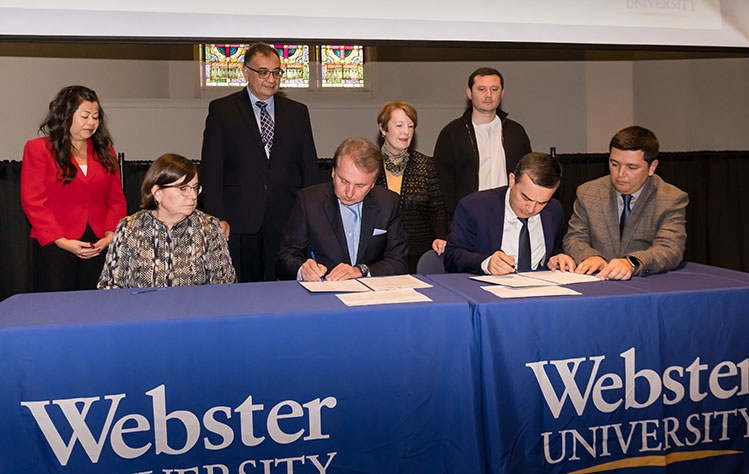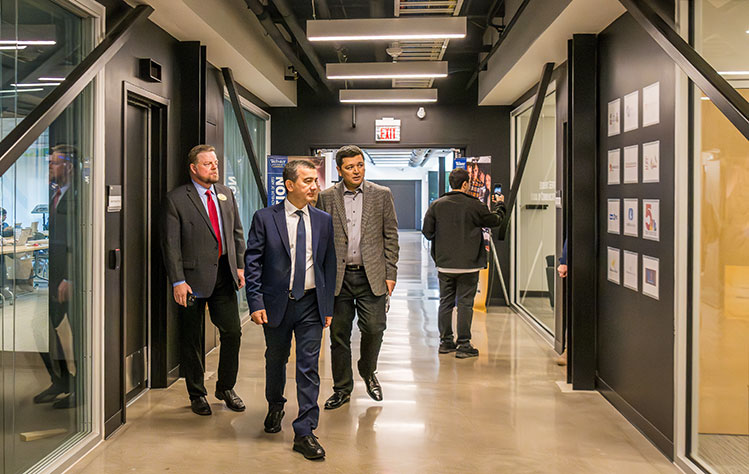Webster University Signs Agreement with Uzbekistan Government to Build a New Campus in Tashkent
December 11, 2023
 Webster University and The Republic of Uzbekistan’s Ministry of Higher Education and
the Ministry of Construction signed an agreement Thursday to build a new campus in
Tashkent. The campus will accommodate Webster’s tremendous growth. Currently, Webster
Tashkent is the University’s largest international campus and second-largest campus
overall.
Webster University and The Republic of Uzbekistan’s Ministry of Higher Education and
the Ministry of Construction signed an agreement Thursday to build a new campus in
Tashkent. The campus will accommodate Webster’s tremendous growth. Currently, Webster
Tashkent is the University’s largest international campus and second-largest campus
overall.
The agreement was signed during a ceremony on Webster’s main campus in St. Louis. Construction, which will be fully funded by The Republic of Uzbekistan, is expected to start next year and be completed in 2026.
“We have found good friends in The Republic of Uzbekistan, and today this friendship has become part of our family,” President Julian Z. Schuster said during the signing ceremony. “We are writing a new chapter in Webster’s history. This would not have been possible without the hard work of our faculty, academic deans, department chairs and our staff, who helped forge and foster this relationship and made it stronger.”
Sarvarkhon Buzrukkhanov, the deputy Minister of Higher Education of the Republic of Uzbekistan, said Webster University Tashkent was the cornerstone of a reformation of higher education in his country that was spearheaded by Uzbekistan President Shavkat Mirziyoyev.
“There were only 17 public universities in 2017, and now there are 210. Webster was the first university from America, and today is still the only American University in Uzbekistan,” Buzrukkhanov said. “Because of Dr. Schuster’s leadership, Webster teaches 4,200 students in multiple graduate and undergraduate programs. I have no doubt we will achieve bigger goals together in the future.”
The ceremony was held in the Winifred Moore auditorium, which Chancellor Elizabeth (Beth) J. Stroble told the audience was a fitting location for the announcement of a new campus.
“We are standing in the first structure built for Webster University, and the cornerstone that served as the foundation for this institution is just outside this wall,” Stroble said, while pointing to the location for the historic stone that marked Webster’s founding. “We are celebrating leadership, friendship and a shared vision and mission, all components of our shared success. It is a remarkable achievement.”
Details about the construction and plans of Webster Tashkent were shared by Rasul Rakhmonov, executive director of the Center for the Implementation of Webster University Programs in Tashkent. Webster will continue to operate in its current location. The new campus will be constructed about 15 miles east of the current campuses alongside new government buildings and a campus for the new Presidential University in an area named “The New Tashkent City Center.” Webster’s campus will be built on 15 acres that was donated for the project, and the buildings are part of the larger government-funded City Center project. When completed, it will have classroom space for 10,000 students along with residential halls that can accommodate 2,000 students. Along with the new campus, plans are underway to also add new academic programs for undergraduates and graduates.
Vice President of Academic Affairs Nancy Hellerud said that the new campus in Tashkent will benefit all Webster students. “The campus will provide academic and residential opportunities for students from across the network to study abroad at Webster University Tashkent, and for faculty and staff mobility as well ” she said. “We could not be happier with the partnerships that we have forged in Uzbekistan.”
 Before the signing ceremony, Webster administrators gave the government officials
a tour of the main campus so they could personally see the types of facilities Webster
currently uses. Buzrukkhanov said that the delegation also visited Webster Vienna
last week for the same purpose.
Before the signing ceremony, Webster administrators gave the government officials
a tour of the main campus so they could personally see the types of facilities Webster
currently uses. Buzrukkhanov said that the delegation also visited Webster Vienna
last week for the same purpose.
During Thursday’s ceremony, officials from Uzbekistan also presented Webster University President Julian Z. Schuster with the honorary badge of “Excellence in higher Education” in recognition of Webster Tashkent’s tremendous success. Afterward, Schuster said the award was for all faculty and staff at Webster University. “Without them, we would not have been presented with this award.”
This is one of several agreements between Webster and numerous entities in Uzbekistan to expand Webster’s services in that country. In November, Webster University and the National University of Uzbekistan signed a memorandum of understanding to explore potential partnerships, expand existing academic programs and create new ones in the Tashkent region.
Earlier this year, Webster University signed an agreement with the Republic of Uzbekistan’s Ministry of Health to explore ways the two institutions can bolster health education at Webster’s Tashkent campus. That was followed by a second visit by officials from the Ministry of Health along with administrators from health clinics and hospitals in Uzbekistan to discuss what programs are most needed in the region.
In September, Stroble, Schuster and a delegation of Webster faculty visited Uzbekistan to participate in the week-long “Uzbekistan-USA Healthcare Week: A celebration of International Collaboration and Achievement” and to also meet with medical professionals and educational representatives to advance those partnerships.
Webster’s campus in Tashkent opened with in 2018 with a masters in Teaching English as a Second Language, and expanded in 2019 with several additional undergraduate and graduate programs. Today, the campus has students from 25 countries.
